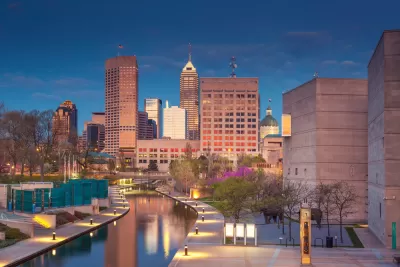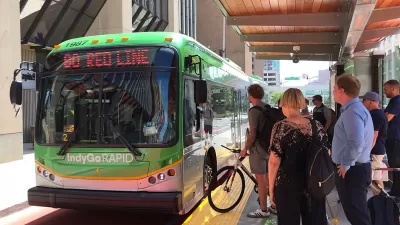It took awhile, but the city of Indianapolis has finally approved the nation's newest income tax to raise revenue for the IndyGo public transit system.

[Updated March 1, 2017] "The Marion County transit system is getting its first major expansion," reports James Briggs.
The City-County Council on Monday approved a 0.25 percent income tax hike that will pump more than $54 million a year into the county's meager bus service. The money will pay for the construction of three bus rapid transit lines, new buses, increased route frequency and new sidewalks and bus shelters.
The transit tax was closely watched by transit advocates around the country, as well as locals, for its unique method of raising revenue and its approval process. Planetizen readers will recall that Marion County voters overwhelmingly supported the income tax for transit, by approving Question 2 in the November 2016 election. The Indianapolis City-County Council delayed action on the results of that vote until yesterday. According to Briggs, the tax took years to approve, moving through layers of bureaucracy at the state and county levels, before finally gaining the approval of the Indianapolis City-County Council.
Now that the whole process is said and done, the income tax hike will take effect in October, explains Briggs, "costing Marion County residents about $100 per $40,000 of income."
[An earlier version of this article incorrectly described the Indianapolis transit tax as the first of its kind. Cincinnati has a 0.3 percent earnings tax that funds transit.]
FULL STORY: Indy council approves transit tax

Alabama: Trump Terminates Settlements for Black Communities Harmed By Raw Sewage
Trump deemed the landmark civil rights agreement “illegal DEI and environmental justice policy.”

Planetizen Federal Action Tracker
A weekly monitor of how Trump’s orders and actions are impacting planners and planning in America.

Why Should We Subsidize Public Transportation?
Many public transit agencies face financial stress due to rising costs, declining fare revenue, and declining subsidies. Transit advocates must provide a strong business case for increasing public transit funding.

Understanding Road Diets
An explainer from Momentum highlights the advantages of reducing vehicle lanes in favor of more bike, transit, and pedestrian infrastructure.

New California Law Regulates Warehouse Pollution
A new law tightens building and emissions regulations for large distribution warehouses to mitigate air pollution and traffic in surrounding communities.

Phoenix Announces Opening Date for Light Rail Extension
The South Central extension will connect South Phoenix to downtown and other major hubs starting on June 7.
Urban Design for Planners 1: Software Tools
This six-course series explores essential urban design concepts using open source software and equips planners with the tools they need to participate fully in the urban design process.
Planning for Universal Design
Learn the tools for implementing Universal Design in planning regulations.
Caltrans
Smith Gee Studio
Institute for Housing and Urban Development Studies (IHS)
City of Grandview
Harvard GSD Executive Education
Toledo-Lucas County Plan Commissions
Salt Lake City
NYU Wagner Graduate School of Public Service





























